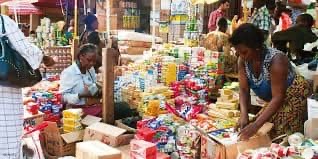The Ghana Union of Traders Association (GUTA) has accused the Minister of Trade and Industry, KT Hammond, for not doing enough to alleviate the challenges associated with the high cost of doing business in the country.
GUTA contends that instead of the minister taking proactive measures and implementing policies to reduce business costs at entry points like ports, he has rather resorted to making contentious remarks on the streets about traders.
GUTA indicated that the country is not in a price control regime, hence no instruction or direction is followed in the determination of prices of goods and services in the country. This comes on the back of recent complaints by Trades Minister, K.T Hammond about the prices of goods, particularly the price of cement in the country.
“We’re not in a price control regime; therefore, businesses do not take instructions or directions from any quarter in determining prices of goods and services,” the association noted in a statement issued, last week, signed by its President, Joseph Obeng.
GUTA emphatically stated that the business community does not take “delight in arbitrary increase in prices of goods and services, and that prices are actually determined by accumulation of cost of doing business in the country, which members of the business community have been complaining bitterly all these years”.
It noted that the “surest way to reduce and stabilise prices of goods and services is for the policy makers to prune cost of doing business in the country, in terms of the duty we pay, fees and charges, including shipping line charges, transportation cost, the increasing utility tariff regime” among others.
It added that this was the more reason, the minister should have met with “the cement producers to find out the cost of the increase in their prices”.
Also, Clement Boateng, the Vice President of GUTA, criticised the minister for a lack of vision in facilitating a decrease in the overall cost of doing business in the country.
He urged the minister to step out of his office and personally acquaint himself with the cost of duties paid by importers at entry points.
Mr Boateng emphasised that the exorbitant duty fees at Ghana’s ports necessitate traders passing on the costs to the end consumers.
Mr Boateng disputed the perception that Ghanaian traders are intentionally increasing prices, pointing out that duty costs in neighboring Togo are 1 per cent, and it is 2 per cent in Ivory Coast, whereas Ghana’s duty rate stands at 5 per cent.
He questioned whose actions were contributing to the elevated prices of commodities in the country.
Furthermore, Mr Boateng highlighted that GUTA had submitted suggestions to the government during the 2024 budget presentation, advocating for a reduction in the costs associated with doing business in Ghana.
However, he lamented that none of these proposals were incorporated into the final budget statement presented by the Finance Minister to Parliament.
Mr Boateng raised the question of accountability, asking who should be held responsible for the persistently high costs in the country.

